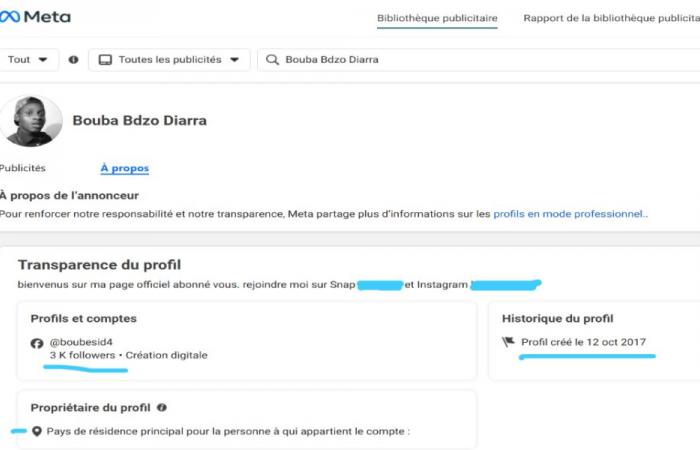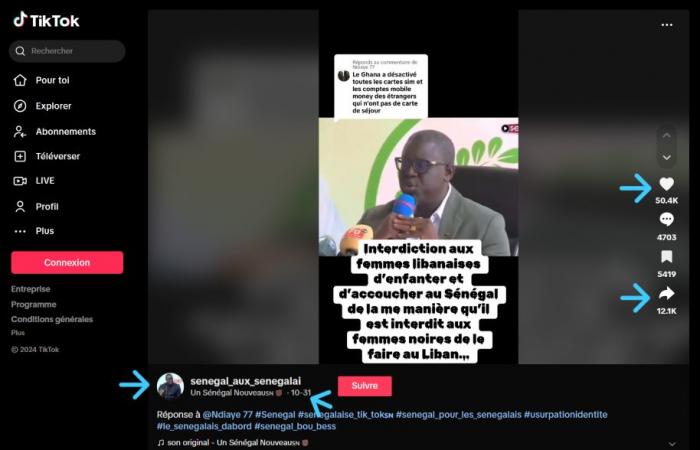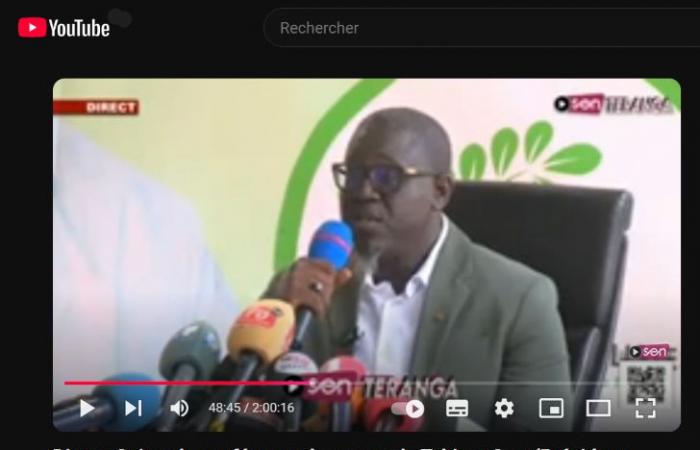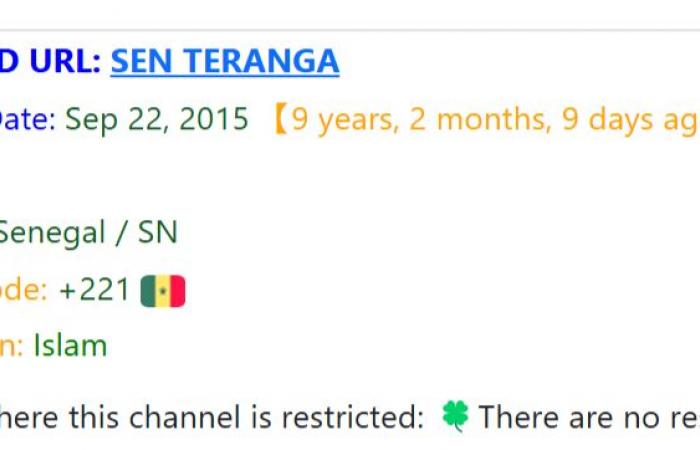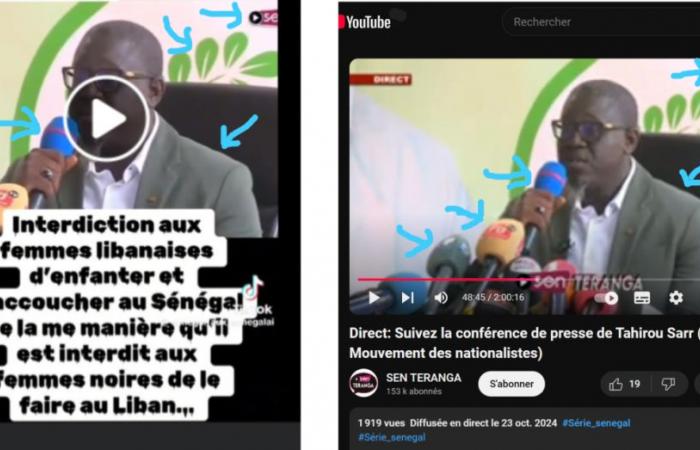Ouestafnews – In October and November 2024, Internet users reported on Facebook a supposed ban on giving birth in Senegal for Lebanese women as a measure of reciprocity, based on snippets of a statement from a candidate in the Senegalese legislative elections of 2024. There is no such decision in Senegal, according to verification carried out by Ouestaf News.
“Lebanese women are prohibited from giving birth and giving birth in Senegal in the same way that black women are prohibited from doing so in Lebanon…”, is written on a fixed banner in a short video shared on 1is November 2024 at 9:34 p.m. local (and GMT) among an Internet user identified as Bouba Bdzo Diarra.
This publication is accompanied by a text written in shaky French and riddled with mistakes: “Black women are prohibited from giving birth in Lebanon. Reciprocity is strong, Senegal has also just banned giving birth to Lebanese women in Senegal, well done, I even wish thing in all black countries.”
In the video, lasting one minute 15 seconds, the Senegalese politician Tahirou Sarr speaks in a mixture of French and Wolof, who states in particular that “black women are prohibited from giving birth in Lebanon”, without more details.
Mr. Sarr, who presents himself as a nationalist, was a member of the coalition that brought to power in March 2024 the current Senegalese president, Bassirou Diomaye Faye, of the Pastef party (African Patriots of Senegal for Work, Ethics and Peace). fraternity).
President Faye dissolved the National Assembly in September 2024 and set early legislative elections for November 17, 2024. Pastef decided to go to the polls alone, without the coalition formed during the presidential election. Tahirou Sarr assured the press that he remained “next to the regime” of Bassirou Diomaye Faye, and claimed his membership in the presidential camp.
Mr. Sarr was a candidate for the legislative elections, at the head of the list of a coalition called “The Nationalists/Jël liñu moom”, an expression in Wolof which can be translated as “Take what is ours” (safeguarding Ouestaf News here). To refer to them in the rest of this article, Ouestaf News will use “Les Nationalistes”.
Internet user Bouba Bdzo Diarra is a digital creator from Bamako, Mali, according to information he provided to Meta, owner of Facebook.
Her page on this network was created on October 12, 2027. It is linked to accounts on other social networks as well as a personal site, which was inaccessible on December 11, 2024. On the same date, she was followed by some 3,000 accounts or individuals.
The short film shared by Bouba Bdzo Diarra originally comes from the video sharing platform TikTok, as indicated by the logo and username appearing in the first four and last four seconds of the video.
Ouestaf News found the video on TikTok on the account identified as Un Sénégal Nouveau, registered under the pseudonym “@senegal_aux_senegalai”. It was published there on October 31, 2024. As of December 11, 2024, it had attracted more than 4,700 comments, it had been “liked” more than 50,000 times and it had been shared more than 12,000 times.
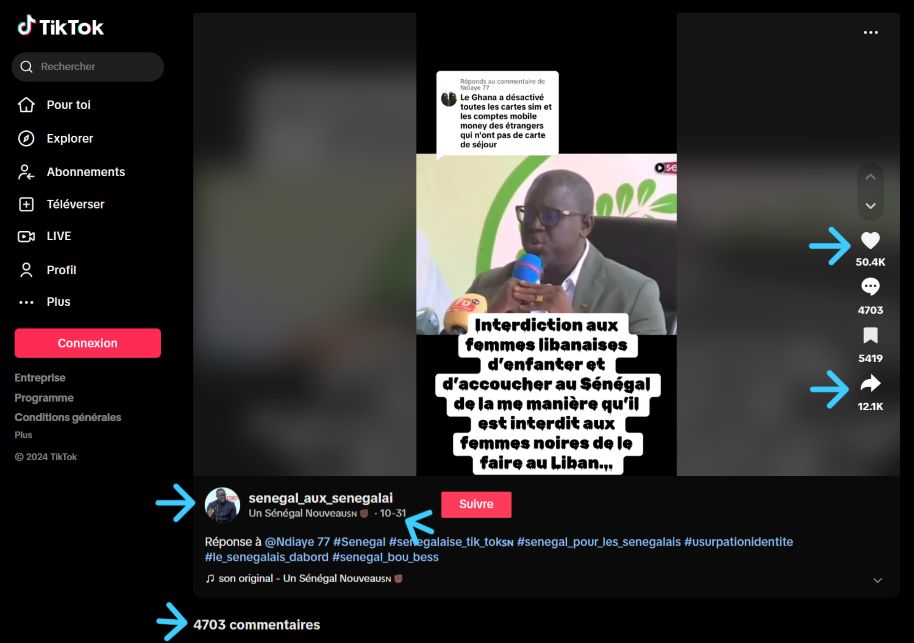
The same video extract from Tahirou Sarr was relayed by other individuals or accounts on Facebook, on Instagram, on X (formerly Twitter) and other platforms, a sign of its virality on social networks where it sparked lively debates in Senegal. Some approved the politician’s comments, considering that he aims to protect the economic and social interests of the country. Others condemned them, denouncing in particular xenophobic discourse and endangering social cohesion in Senegal and the lives of Senegalese in the diaspora.
The controversy was all the more intense as Senegal was in the pre-electoral period. Regulatory and self-regulatory organizations of the media sector in the country had called on press actors to be responsible in handling such campaign speeches, and to avoid serving as a platform for messages promoting discrimination, intolerance, racism, exclusion from a community or hatred.
Truncated extract from a video broadcast live on October 23, 2024
Ouestaf News carried out a reverse image search of the extract contained in the verified publication using in particular the dedicated tools InVID-We Verify and Google Images. The results of the search made it possible to go back to the original video: it is an intervention in front of the press by Tahirou Sarr on October 23, 2024 in Dakar, which was broadcast live on YouTube by the Sen Teranga account . His recording was publicly available until this article was posted online.
Sen Teranga’s channel, registered in Senegal, was created in September 2015 and had some 153,000 subscribers as of December 11, 2024, according to YouTube data.
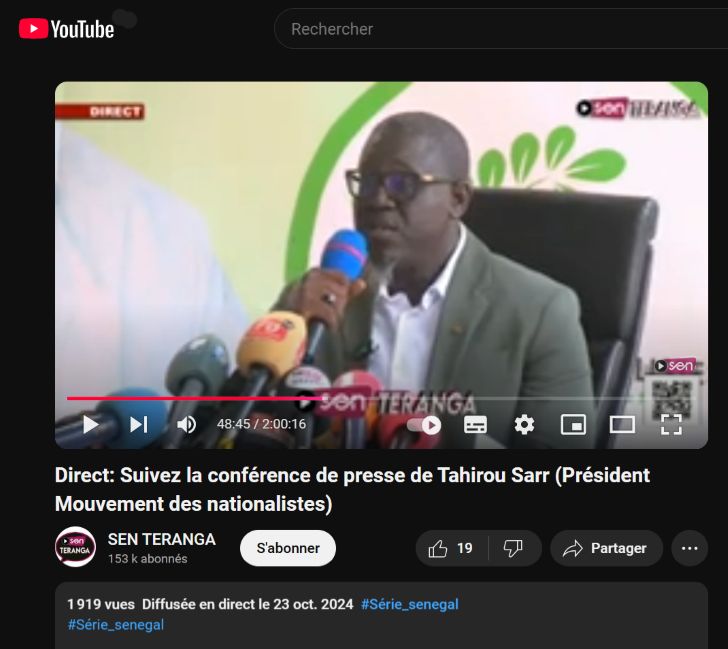
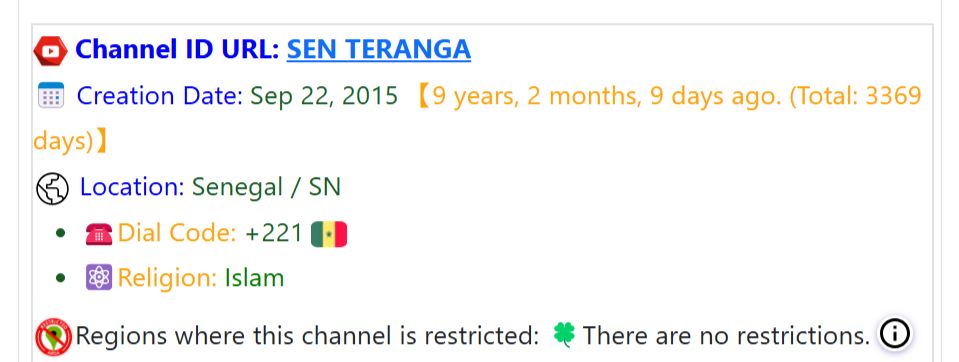
The full video of Tahirou Sarr’s statement lasts 2 hours and 16 seconds, the extract used in the verified publication is from 48 minutes 30 seconds from the start. We can recognize in the extract shared on social networks visual elements appearing in the video broadcast by Sen Teranga (same jacket and same shirt of the speaker, microphones with blue and yellow windshields, logo with green leaves in the background and part of the Sen Teranga logo.
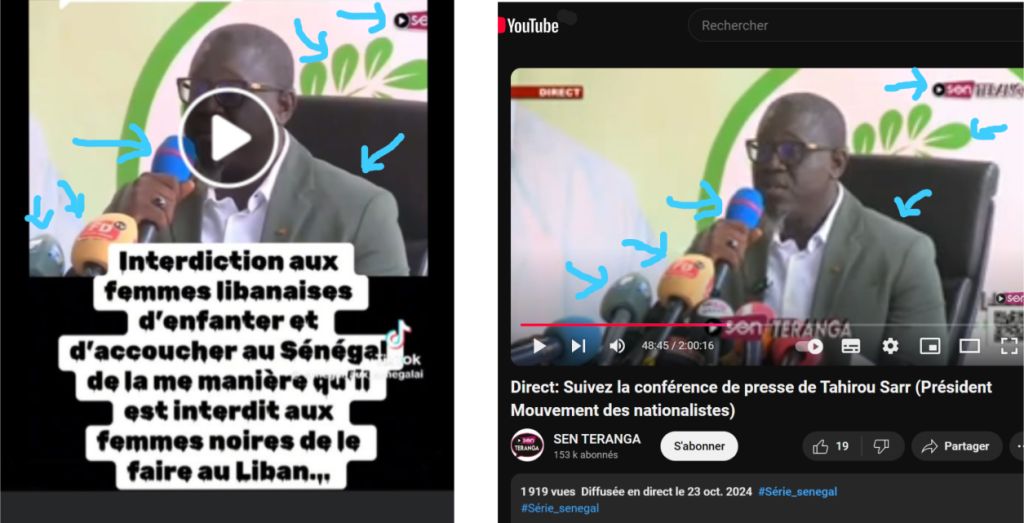
By listening to the entire video of the press conference, we see that the extract used has been truncated, because, in the full video, Tahirou Sarr explains that if he is elected deputy, he intends to submit to the National Assembly several proposed laws, including one that would prohibit Lebanese women “from giving birth and giving birth in Senegal in the same way that black women are prohibited from doing so in Lebanon…”. This therefore invalidates the first part of the allegation relayed in the verified publication.
No documented proof
The Senegalese National Assembly was dissolved on September 12, 2024.
Until this dissolution, no law supporting this allegation has been passed in Senegal, indicated Ouestaf News, the institution’s communications service, when questioned on the subject. From the same source, no proposal or bill in line with the verified allegation was found in the archives until the installation of the elected deputies on November 17, 2024. The new Senegalese National Assembly held its first session on December 2, 2024, it was noted.
Read our article: « Senegal – Legislative: democratic tradition respected »
Furthermore, according to the Association of Senegalese Jurists (AJS) contacted by Ouestaf News, no draft law of this type has ever been submitted to the National Assembly of Senegal. “Women, whether Senegalese or foreign, have the freedom to give birth in the hospitals of their choice and clinics if they have the means,” declared this organization which has existed since 1974 and campaigns in particular for women’s rights. and their promotion in Senegal.
In addition, research carried out by Ouestaf News did not make it possible to find any legislative or regulatory measure proving the allegation of the verified declaration: neither presidential decree nor ministerial decree.
No formal law, but “kafala” in Lebanon
Ouestaf News also found no formal law regarding the allegation that “black women are prohibited” from giving birth in Lebanon.
However, research as part of this audit revealed accounts that domestic workers of different origins, including women from sub-Saharan Africa, were forced to leave Lebanon to give birth when they became pregnant there. According to these stories, these situations are based on a system known as “kafala” (or “kafala”), translated into French as “sponsorship”, which is denounced in particular by human rights organizations including Amnesty International and Human Rights Watch (HRW).
“In Lebanon, migrant domestic workers are not covered by the Labor Code. The legal framework that governs the entry, stay and work of these people in the country is the kafala system,” explains Amnesty International in a report published in 2019 on “the exploitation of migrant domestic workers in Lebanon” (safeguard from Ouestaf News here).
This system “consists of a set of laws, decrees, ministerial orders, regulations and customary practices” concerning “the entry and stay of foreigners”, their exit and their work, according to this international NGO. It is “a system of sponsorship of migrants which is by its nature a source of abuse and increases the risks of exploitation, forced labor and human trafficking, without giving victims any real possibility of obtaining compensation”, denounces Amnesty International in this report, entitled “Their house is my prison”.
In December 2023, HRW reported that the Lebanese Ministry of Labor had attempted to pass a unified standard contract “that would have introduced vital guarantees for foreign workers,” an attempt that was blocked in 2020 by recruitment agencies. these servants.
False claims
After verification by Ouestaf News, including with associations and parliamentary sources in Senegal, there is no ban on giving birth in Senegal to Lebanese women as a measure of reciprocity, contrary to the allegations of Internet users in October and November 2024 .
Ouestaf News also found no formal law regarding the allegation that “black women are prohibited” from giving birth in Lebanon.
HD-CS/ts
Would you like to react to this article or report an error to us? Send us a message at info(at)ouestaf.com.


